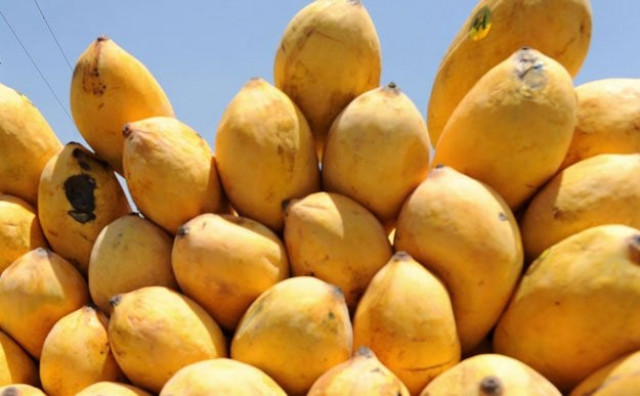Pakistan’s mango exports denied Dutch visa
Presence of fruit flies results in rejection of consignment.

Until now, Pakistan has successfully exported 26,000 tons of mangoes this season, which started during the third week of last month. PHOTO: AFP
“This is the first rejection of any mango consignment this season. We have further tightened up the clearance measures to control the situation,” Department of Plant Protection (DPP) Director General Dr Mubarak Ahmed said on Friday.
Like last year, the challenges of fruit flies and other issues are proving to be thorns in the way of mango exports. The situation is tricky because the EU had already made it clear last year that more than five rejections may result in a complete ban on Pakistani fruit and vegetable imports in the European markets, he added.
The rejected consignment in Amsterdam was sent through air weighing 4.5 tons. Until now, Pakistan has successfully exported 26,000 tons of mangoes this season, which was started in the third week of last month.
Last year, the EU – one of the world’s most attractive markets for fresh fruit exports – slapped a ban on some Indian vegetables and fruits, including mangoes that badly hurt Indian exports.
Taking a timely lesson, Pakistan took concrete measures last year to avoid any such bans on its fruit and vegetable exports.
DPP, for the first time in the country’s history, introduced a well-known global practice of tracking fruits farms and even trees in May 2014 to standardise mango exports to the European Union (EU).
The practice did well, and mango exporters fetched a better price, which in some cases was even double of the average this year. This encouraged authorities to replicate the system to other fruits and vegetables.
DPP is one of the 14 organisations that work under the Ministry of National Food Security and Research and provides complete quarantine facilities to the fruit and vegetable growers. It came into the limelight last year when it took unorthodox measures in enforcing quarantine rules in the country for the imports and exports of fresh and other farm products.
Competitive neighbours?
For India, Brussels had outlawed its mangoes in May 2014, stating that it had found fruit flies and pests –which could have harmed European crops – in 207 Indian consignments of fruits and vegetables.
But an inspection by the EU found that India has since tightened controls and also promised corrective measures, and with the reversal of the two-year ban imposed on India earlier this year, the impression was that Pakistan would face strict competition in the EU markets.
However, according to The Times of India, mango production might decline this year by 35-40% due to crop damage following unseasonal rainfall in major growing states. A study conducted by the Associated Chambers of Commerce and Industry of India (ASSOCHAM), mango exports have fallen significantly in recent years in quantity terms. Exports dropped from 55,585 tonnes in 2012-13 to 41,280 tonnes in 2013-14, registering a fall of about 26% year-on-year.
Faced with stiff competition from Pakistani counterparts in the EU, Indian exporters have raised concerns about the lack of proper storage facilities and pack-houses at key mango growing regions, the Times of India stated in its news.
“We have learnt that Pakistan is not only providing additional subsidy on freight for mango shipments, but it has also created a separate department for mango exports, which ensures awareness about the quality in mango production. When countries are opening up for Indian mangoes, we should not miss this opportunity because of lack of good quality fruit,” said Bhavesh Jotangia, partner at M&J Enterprise, Vashi, Mumbai.
Published in The Express Tribune, June 20th, 2015.
Like Business on Facebook, follow @TribuneBiz on Twitter to stay informed and join in the conversation.


















COMMENTS
Comments are moderated and generally will be posted if they are on-topic and not abusive.
For more information, please see our Comments FAQ